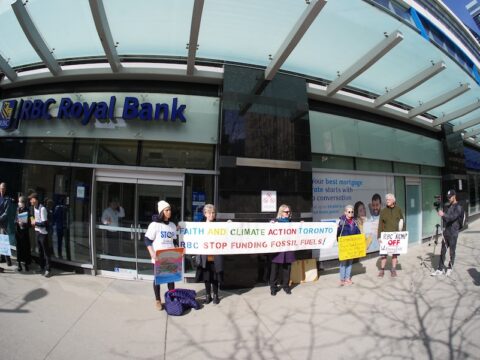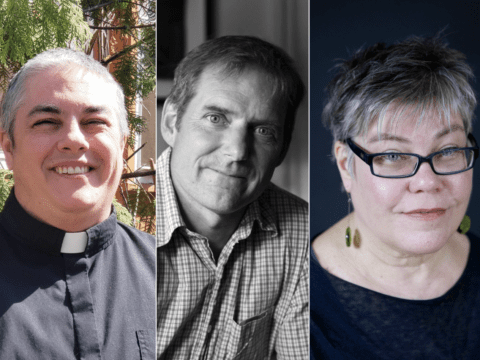Even as a young boy, Peter Scott* knew he was out of place in the Pentecostal church he grew up in. “While everyone else was speaking in tongues and having visions and being filled with the Spirit, I’d be sitting there waiting for God’s glory to fall on me and it never happened,” says the 43-year-old Vancouver man. “At the time I figured it was because I was such a sinner. I definitely felt like something was wrong with me because I didn’t have these experiences.”
Something was terribly wrong in Scott’s life, but it wasn’t his inability — or unwillingness — to speak in tongues. It was the fact that his father, an elder in the church, would regularly whip his back with a leather belt from the time he was a young boy until he hit his early teens. Scott found the courage to broach the subject of his father’s violence with his church pastor, who gave him a religious book to read and then proceeded to avoid him. It wasn’t until Scott got therapy in his early 20s that the trauma of his childhood sank in. “I came to see the negative impact that my parents and my religion had on me,” he says. He knew the oppression and control had to end.
You may unsubscribe from any of our newsletters at any time.
For those indoctrinated in an authoritarian religion, leaving the fold can be a harrowing experience. They may be shunned by a community that once embraced them, subjected to threats of eternal damnation and even harassed by church elders. While some may find a new church home in more liberal denominations like the United Church, others reject religion altogether. But often the most wrenching part of the experience is breaking away from parents whose extreme dogmatism makes any kind of relationship untenable. Exiled from their mother and father, they may feel like a black sheep — alone in the world, unloved, misunderstood and punished for having independent views about faith and religion.
The turning point for Scott came when he eventually confronted his father about the abuse. “I told him he was an angry, violent person who hides behind religion. I asked him how he could have beat me when I was just a little kid.” His father used the Bible to justify the beatings, drawing on that oft-quoted verse about sparing the rod and spoiling the child. “When I told him it’s just wrong for a grown man to beat a child, his response was, ‘Well, you turned out okay.’” Scott urged his father to take responsibility for his actions and to consider going into therapy. His dad shrugged it off, and their relationship, in effect, was over. So was Scott’s affiliation with the church.
Today, some 20 years later, the two talk briefly once or twice a year on the telephone, mostly about the weather. “There really isn’t much to say,” says Scott, who acknowledges that he still grieves the end of their relationship.
Many adult children like Scott are torn between the desire to be true to themselves and the need to have a connection with their family. “There is this tension between two very strong needs — your own personal integrity and your need for intimacy and relationship,” says Marlene Winell, a psychologist in San Francisco and the author of Leaving the Fold: A Guide for Former Fundamentalists and Others Leaving Their Religion. “The longing for closeness, belonging, acceptance and understanding from your family — especially your parents — is a primary need for any human being.”
Winell, who grew up the daughter of overseas missionaries and eventually left the Assemblies of God church, specializes in counselling people from strict religious backgrounds who are coping with the negative repercussions of leaving their faith tradition. She holds workshops for “letting go of religious indoctrination and reclaiming your life” and has coined the term “Religious Trauma Syndrome” to describe the damage that can occur from being part of rigid faith groups.
She compares leaving a fundamentalist religion with coming out as gay or lesbian. Anger and grief are common parental responses. “Parents may feel hugely offended that their belief system is being rejected, or they may feel a sense of failure because they were supposed to raise you to believe a certain way.”
For adult children who leave the church, negotiating a relationship on new terms can be tricky. Sometimes the relationship is forever severed, but most often there’s an uneasy truce, and occasionally parents and children can lay their differences aside in an effort to have a loving relationship.
That’s what happened with Sandy Harper,* a 28-year-old mother of two from Toronto who reconciled with her parents after leaving her “fanatical born-again Christian home” when she was 16. Things began to unravel when she got a job at a local movie theatre and made friends with teenagers outside her church group for the first time. As she began to question her faith, her parents submitted a letter of resignation on her behalf to her employer.
Harper left home and moved in with a family in the neighbourhood while she completed high school. She didn’t speak to her parents for close to a year, but eventually they started to come around. “My mom apologized to me and admitted that she didn’t handle things right. She said, ‘We love you and we can’t do this anymore, we miss you and want you to move back home.’” Harper instead met with her parents for Sunday dinners over a period of a few months to hammer out how they could develop a healthier relationship.
“There were a lot of tears, and I had a knot in my stomach for most of that time,” she says, recalling how challenging it was to tell her parents she didn’t want to talk with them about church or God. “I was very adamant about what the boundaries were.” She moved back home when she was 19 and today she lives down the street from her parents, who see their grandkids on a regular basis. “I’m as close as I possibly could be with my parents given our differences,” says Harper. Still, she admits that she lives with the nagging feeling that she has disappointed them.
While reconciliation of the type Harper experienced is possible if both sides are open to accepting each other, it can be a slow and difficult process, notes Malcolm Cameron, a Vancouver counsellor whose doctoral research examined the lives of people who left evangelical fundamentalism. “Underlying tensions are likely to be present at some level, even after years of being apart,” he says.
And while adult children may feel a sense of freedom for having escaped what they view as a restrictive religion, they often live with a sense of loss. “The decision to leave can result in feelings of guilt or shame, questions concerning whether or not they did the right thing, and, at times, a strong sense of needing to ‘go home’ or to return to their families in order to maintain peace at all costs,” he says. “Some adult children will deny themselves in order to try to make the relationship work. They will continue to hold the hands of their parents to keep the peace, but in the end they’ll pay a price for not being able to express themselves freely.”
Deirdre McIntyre,* 50, of Edmonton, is paying that price. She has struggled most of her adult life in an uneasy relationship with her parents. Raised in a strict Baptist home, she converted to Catholicism about 10 years ago. This infuriated her parents, who labelled her “Satan’s tool” and told her she was going to hell and bringing her three children with her.
When they cut off ties, McIntyre felt a weight had been lifted. “I essentially was divorced from my parents and was fully prepared to live the rest of my life without them.” But then a year later her mother called.
“She told me she missed me,” recalls McIntyre. Guilt drove her to re-establish the relationship. “I wanted to say no, but I didn’t know how. What is it that draws us to our parents, even when they harm us?” she asks. They don’t fight about religion anymore, but the relationship has been permanently damaged. Visits are infrequent and conversation is limited to topics such as the weather and home repairs.
“I feel like I’m living a dual life — I can’t tell them what I believe and I can’t be real with them. It’s a very superficial relationship,” says McIntyre, who has since left the Catholic Church and now considers herself an “anti-theist secular humanist.” In the end, she observes, “I just don’t know what to say to my parents — so I say nothing.”
*Names have been changed
***
This story first appeared in The United Church Observer’s June 2011 issue with the title “Casting off.”












